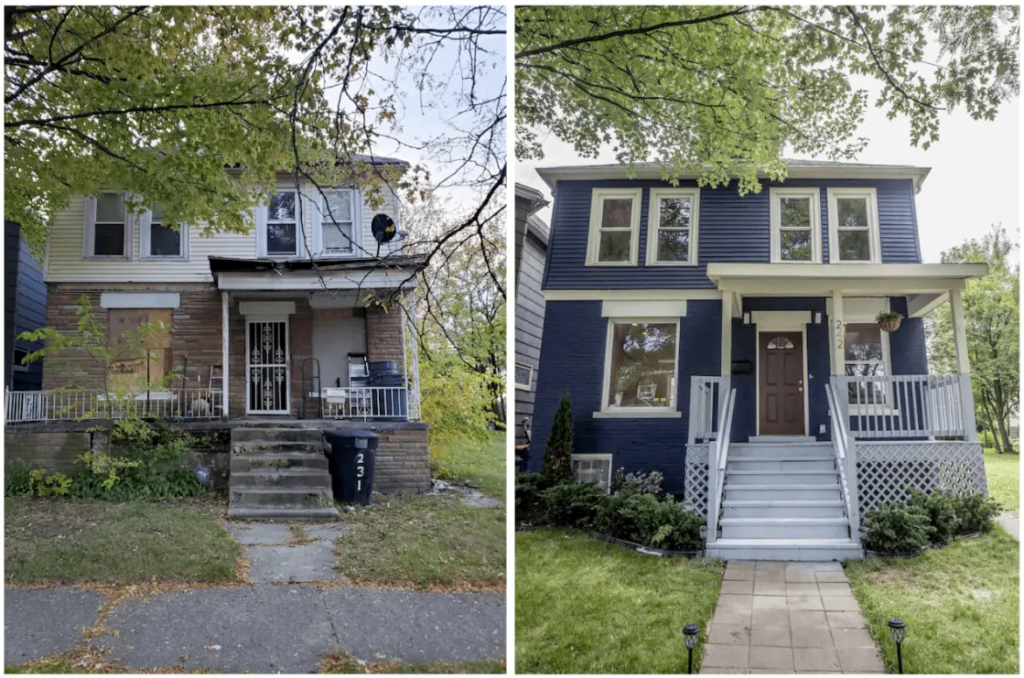
Websites like Airbnb, VRBO, and Homeaway have made it easy for short-term rentals to gain popularity among real estate investors today. In Michigan specifically, you’ll benefit from the growing short-term property market, generate a higher return on investment compared to traditional rental properties, and quickly find new guests thanks to online booking platforms.
Michigan is one of the hottest real estate markets in the nation today. The only thing left is to know which city to purchase your short-term rental in, which we’ve listed below.
5 Best Michigan Cities for Investing in Short-term Rentals
We based our list on two key factors: high cash-on-cash returns and rental income. They contribute the most to your short-term rental investment success, which is why we’ve based our list on the two factors.
Disclaimer: All the figures below come from Mashvisor, AirDNA, and Zillow reports.
1. Traverse City, MI
Traverse City is the largest city in Northern Michigan, and the largest producer of tart cherries in the nation. In 2012 alone, more than 3.3 million visitor trips were made to this city, resulting in $1.18 billion in direct spending toward its tourism sector.
Guests come here to see the grapevines at Traverse Wine Coast, swim in deep freshwater lakes, and grab a cold one in many craft beer spots. Traverse City is a rustic, charming small city filled with artists, craftsmen, and musicians that contribute to its rich local communities.

- Typical Home Value: $416,822
- Home Value Increase: 25.4% year-on-year
- Cash-on-Cash Return: 7.13%
- Rental Income: $4,572
- Rental Growth: -16% quarter-on-quarter
- Capitalization Rate: 7.13%
- Occupancy Rate: 65.37%
- Active Rentals: 1,310
- Rental Channel: 46% Airbnb, 24% Vrbo, 30% listed on both
2. Grand Rapids, MI
Grand Rapids is one of the fastest growing cities in the nation, attracting travelers interested in art museums, galleries, and competitions. Its tourism industry has also been growing for ten consecutive years from 2009 to 2019, thanks to economic growth and an evolving, diversified community.
Guests come here to visit the John Ball Zoological Garden, Belknap Hill, Gerald R. Ford Museum, Van Andel Museum Center, Frederik Meijer Gardens & Sculpture Park, and Grand Rapids Art Museum. There are also countless craft beer spots, as craft beer is the leading tourism driver in Grand Rapids since 2013.

- Typical Home Value: $308,077
- Home Value Increase: 17.6% year-on-year
- Cash-on-Cash Return: 5.42%
- Rental Income: $3,029
- Rental Growth: 4% quarter-on-quarter
- Capitalization Rate: 5.42%
- Occupancy Rate: 68.79%
- Active Rentals: 438
- Rental Channel: 78% Airbnb, 9% Vrbo, 13% listed on both
3. Kalamazoo, MI
Kalamazoo is known for being the home of the US Tennis Association Boys 18 & 16 Championships for the past six decades, but it’s also the manufacturing domain of Gibson Guitars, Checker cabs, Kalamazoo Stoves, Kalamazoo Sled, Kalamazoo Corset, and Shakespeare fishing gear.
Guests can immerse themselves in the youthful energy and cultural spots in Kalamazoo, such as the Kalamazoo Institute of Arts, Kalamazoo Valley Museum, Gilmore Car Museum, Air Zoo, Bronson Park, Arcadia Creek Festival place, and Kalamazoo Nature Center.

- Typical Home Value: $215,027
- Home Value Increase: 14.4% year-on-year
- Cash-on-Cash Return: 7.31%
- Rental Income: $2,759
- Rental Growth: 8% quarter-on-quarter
- Capitalization Rate: 7.31%
- Occupancy Rate: 70%
- Active Rentals: 151
- Rental Channel: 78% Airbnb, 9% Vrbo, 13% listed on both
4. Dearborn, MI
Dearborn is a historic destination for travelers worldwide. In fact, it is home to Michigan’s leading tourist attraction, The Henry Ford—the nation’s largest indoor-outdoor American history museum and entertainment complex. The Henry Ford alone attracts around 1.6 million visitors every year.
Apart from The Henry Ford, guests can also enjoy Greenfield Village, Arab American National Museum, Henry Ford Estate, Islamic Center of America, Automotive Hall of Fame, and more.

- Typical Home Value: $214,291
- Home Value Increase: 16.4% year-on-year
- Cash-on-Cash Return: 7.48%
- Rental Income: $2,469
- Rental Growth: 19% quarter-on-quarter
- Capitalization Rate: 7.48%
- Occupancy Rate: 61%
- Active Rentals: 63
- Rental Channel: 64% Airbnb, 22% Vrbo, 14% listed on both
5. Lansing, MI
Lansing is Michigan’s capital city that attracts traveling families all year round. The city welcomes around 4.8 million visitors every year that fuels its strong tourism industry.
Here, they can visit the Michigan State Capitol with a cast iron dome, Michigan History Center that details the state’s past, Potter Park Zoo with more than 160 species of animals, Impression 5 Science Center with interactive exhibits, and the R.E. Olds Transportation Museum for unique and vintage cars.

- Typical Home Value: $142,780
- Home Value Increase: 14.6% year-on-year
- Cash-on-Cash Return: 8.66%
- Rental Income: $2,556
- Rental Growth: 8% quarter-on-quarter
- Capitalization Rate: 8.66%
- Occupancy Rate: 65%
- Active Rentals: 212
- Rental Channel: 74% Airbnb, 8% Vrbo, 18% listed on both
Short-Term Rentals, Long-Term Success in Michigan
Take your pick from the list above and start investing in Michigan short-term rentals! All the areas we’ve listed are profitable areas for you to take advantage of local tourism industries.
As long as you conduct property rental investment analysis and create a comprehensive income sheet, you’ll be on your way toward investment success in Michigan.
The list doesn’t end here. We’ve gone ahead and evaluated the rental property opportunities in every Metro Detroit city and neighborhood, too. Head to our Deep Dive series to find more hotspots in Michigan.




